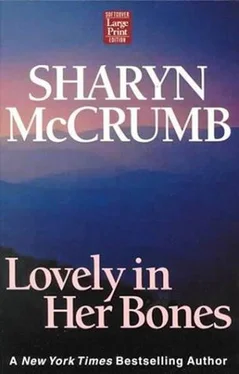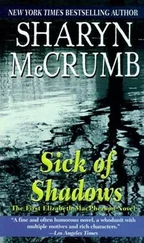Elizabeth nodded, wishing she’d had the sense to bring a notepad with her. “How did you learn so much about wild plants?”
“Handed down in my family,” said the old woman. She stooped to examine a small three-branched plant near the base of a tree. “My grandfather did the root medicine when I was a girl, and he taught me. Indians allus been close to the land. You know how there come to be healing plants in the first place?”
Elizabeth shook her head. She knelt beside Amelanchier and watched her uproot the small plant and carefully rebury the strawberrylike fruit.
“You want to watch how you kneel down out here in the woods,” Amelanchier warned her. “Those copperheads blend right in with the underbrush. And you oughtn’t to jump up quick like that, neither. Slow, steady movements is the best. Got to look out for snakes this time of year; bears mostly minds their own business. Animals aren’t our friends, though, the way the plants are. That’s how the healing plants come about. Back in olden times, when people could still talk to other living things and be talked back to, there was peace among us. But by and by, man began to get above hisself, wanting bearskins to keep him warm, and deer meat for supper, fish for fertilizer. Man became a danger to his fellow creatures. So all the animal folk of the world had a meeting and decided that something would have to be done about it.”
“What did they do?”
Amelanchier dropped another root into the basket. “They brought disease into the world. The bear clan called down rheumatism on every hunter who killed without apologizing to the hunted one, and the deer people wished influenza and colds on those who were ungrateful for the animal hides that kept them warm. Pretty soon every beast and bird had come up with some ailment or another to wish on brother man, till it looked like there wouldn’t be a soul to survive it.”
“What did man do about it?”
“Wasn’t nothing he could do. That would have been the end of us if it hadn’t been for the fact that the plants were our friends. When they heard all these awful things being called up by the animal clans, they decided to help man out. So every tree, shrub, grass, herb, moss-every growing thing decided that it would cure one of those evils. And they do, right down to this day. And when you learn which plant cures which evil-why, you’re practicing medicine.”
“So plants are our friends,” mused Elizabeth, looking at the basket of roots.
“Yep. That’s why I named every one of my young’uns after one. There’s Laurel and Stargrass and Yarrow and Comfrey. He’s my youngest, Comfrey is. Rest of ’em went off and got jobs in the big city. Reckon they’ll be back when they get to be my age.”
“Does Comfrey live with you?” asked Elizabeth, thinking of the tiny cabin.
Amelanchier smiled. “He couldn’t hardly stand all the company I have. No, Comfrey’s got him a little place down in the valley. He comes up to see me, though, ’bout ever’ day or so. He sure is worried about this mining business the Harknesses are pushing for. He reckons it’ll come to us losing the whole valley.”
“We’re not going to let that happen,” Elizabeth assured her.
“Now how do you’uns aim to prove that we’re entitled to the land? We don’t have proof like the Cherokees got-stuff that looks good in a museum for the tourists. We come from the Unaka people, and them folks in Washington ought to take our word for it.”
Elizabeth smiled at Amelanchier’s idea of the workings of the federal government. She explained the basics of forensic anthropology, and the amazing process of determining age, sex, and race from the examination of a skull. In her enthusiasm, Elizabeth sounded much more expert than she actually was, but Amelanchier did not seem particularly impressed. She continued to scour the ground with a practiced eye, occasionally uprooting a small plant or picking a few leaves from a shrub.
“I’m doing the skull measurements myself!” said Elizabeth triumphantly.
“And you can tell all that?” murmured Amelanchier politely.
“Well, no,” Elizabeth admitted. “Dr. Lerche can, of course. I just make measurements for him to check over later. So far he hasn’t had time to look at them. He’s setting up a computer in Laurel Cove.”
Amelanchier straightened up and looked at the fading sky. “I reckon we ought to be starting back,” she announced. “You come on back with me, and we’ll talk some more about plants if you’ve a mind to. Is there anything in particular you’d like to know?” She eyed Elizabeth appraisingly. “I’ve got a sody cure that’ll take weight off’n anybody.”
Elizabeth blushed. “I’d like to hear it. I wish I could get another one of our diggers up here to see you. He’s allergic to everything. Food, dust, bees, cats-everything! Do you have any medicine that would help that?”
“Why, ginseng ought to help some with it. I’ll give you some of my powdered stock, and you take it back there to your camp and burn it, and make your friend inhale the smoke.”
“Is it expensive?” asked Elizabeth doubtfully. She knew that ginseng brought fabulous prices, and that Victor was not worth a fraction of such an expenditure.
“Shoot far,” scoffed Amelanchier. “I don’t charge nothing. Plants just grow wild in the woods, don’t they? They don’t cost me nothing. Now, how would you like to stay for supper? I got a coon Comfrey shot laying up in my freezer, and we could have him with beans and cornbread.”
Elizabeth hesitated. “It’s very kind of you to ask me, but I’ve never… I mean, what does raccoon taste like?”
“Just like bear!” was Amelanchier’s instant reply.
THE MOONLIGHT did not illuminate the gravesite. From the granite ridge above, it looked like a large black square set down among the trees.
“I don’t guess you can tell too much from here,” said Mary Clare.
“I didn’t come up here to look at it,” Alex answered. “But I’ve inspected at closer range. You’re doing a fine job as site manager.”
“I enjoy it, Dr.-Alex.”
He looked up at the night sky. “This whole experience of roughing it out here makes me feel young again. You know, when I was still a grad student, Tessa and I used to spend summers in the desert…” He stopped, realizing that Mary Clare had stiffened at the mention of his wife’s name. “I guess those days are gone,” he finished lamely.
Mary Clare touched his arm. “They don’t have to be.”
“It’s not the same any more. When you’re first starting out, you think you’re going to be another Darwin. Revolutionize the field. But after a while, you’re like those poor beasts in the La Brea Tar Pits: you’re bogged down in mortgages and lectures and bridge games.”
“I know, Alex, but it shouldn’t be like that. What you need is someone who cares about your work instead of just your salary.”
Lerche winced. He’d forgotten how melodramatic people could sound when they were courting. She’s very young, he thought. But isn’t that how I wanted to feel-young again? Suddenly-Alex wasn’t quite sure how-he was holding her. An inborn urge to caution made him ask, “Won’t the others be wondering about us?”
“They’ll think we’re working,” whispered Mary Clare, without really considering it. “Shhh!”
“Hello!” said Elizabeth loudly to all the people she expected to find in the Sunday school room. A moment later, when she looked around, she saw that the only people present were Jake, reading a book, and Victor, who was working on a scale drawing of the site. “Where are Dr. Lerche and Mary Clare?”
“Out necking,” said Jake, turning a page. “You want dinner?”
Читать дальше












